Digital connectivity offers children new ways to learn and connect, but there are widespread concerns that the internet and mobile devices give children easy access to inappropriate content and leave youth vulnerable to overuse and even bullying. Parents are especially concerned about the negative impact that smartphones may have on children, including how these devices could hinder their ability to develop interpersonal skills.
Amid these concerns, parents are taking steps to monitor what their children do online or on mobile devices and set ground rules for their digital technology use.
Roughly seven-in-ten parents think smartphones could bring more harm than good to children
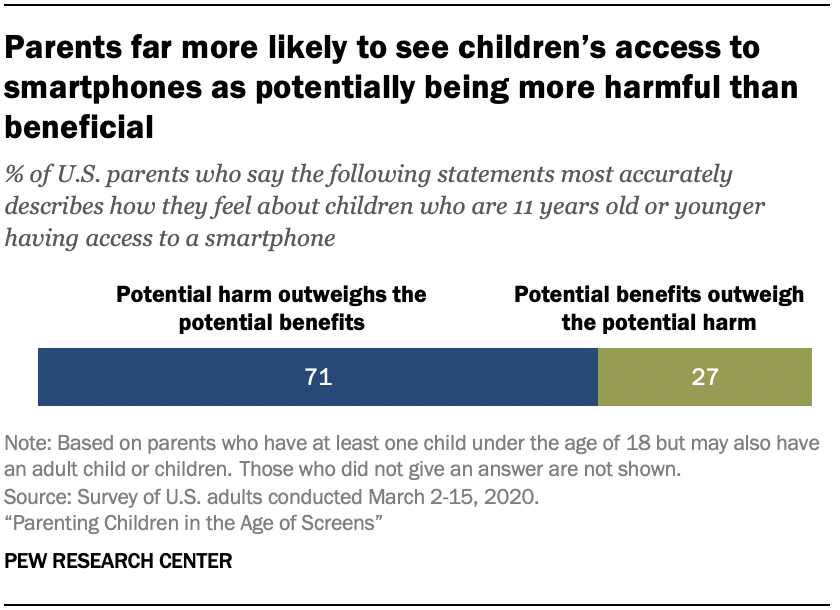
Overall, parents who have at least one child under the age of 18 (but who may also have adult children) are more likely to think smartphones have the potential to do more harm than good on young children. Fully 71% of parents say that the potential harm that children under the age of 12 may face from having access to a smartphone outweighs the potential benefits, while 27% believe the potential benefits outweigh the potential harm.
The belief that smartphones will be more harmful than beneficial to children is widely held across major demographic groups, with majorities of parents saying this regardless of age, gender, racial or ethnic background or educational attainment.
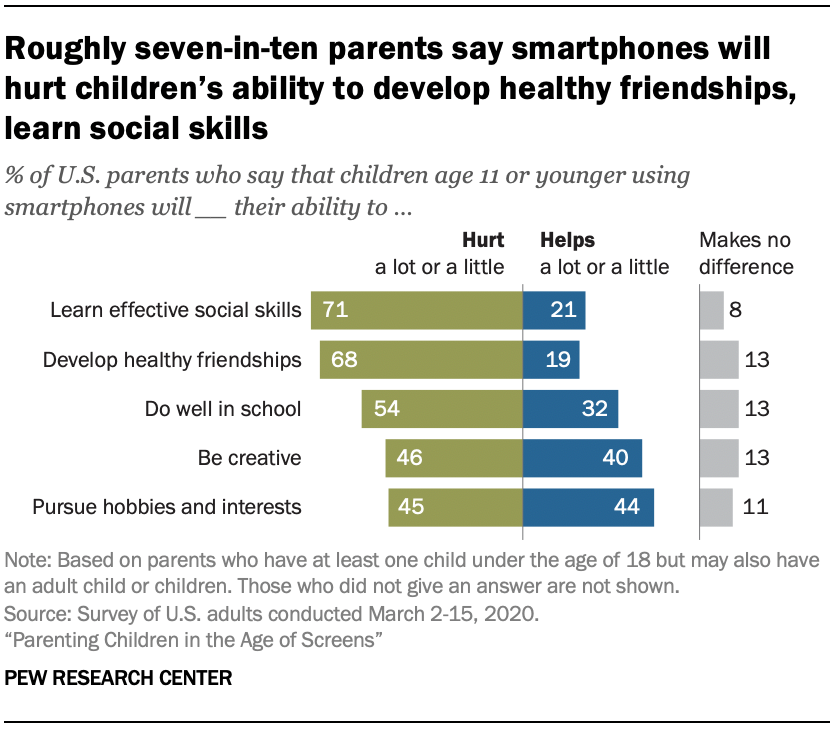
At the same time, parents are particularly concerned that mobile devices could hurt younger children’s ability to interact with others or forge meaningful relationships. Roughly seven-in-ten parents think that children under the age of 12 using smartphones will hurt their ability to learn effective social skills (71%) or develop healthy friendships (68%).
And just over half of parents – 54% – say younger kids’ engagement with these devices will hurt their ability to do well in school.
On the other hand, parents are more evenly divided when it comes to smartphones’ impact on young people’s creativity or pursuit of hobbies. Some 46% of parents say that children under the age of 12 using smartphones will hurt their ability to be creative, while a somewhat similar share, 40%, say it will help. And nearly identical shares say these devices will hurt (45%) or help (44%) a child’s ability to pursue their hobbies and interests.
Only about one-in-ten parents believe that smartphones will not make a difference in a child’s ability to do each of these things.
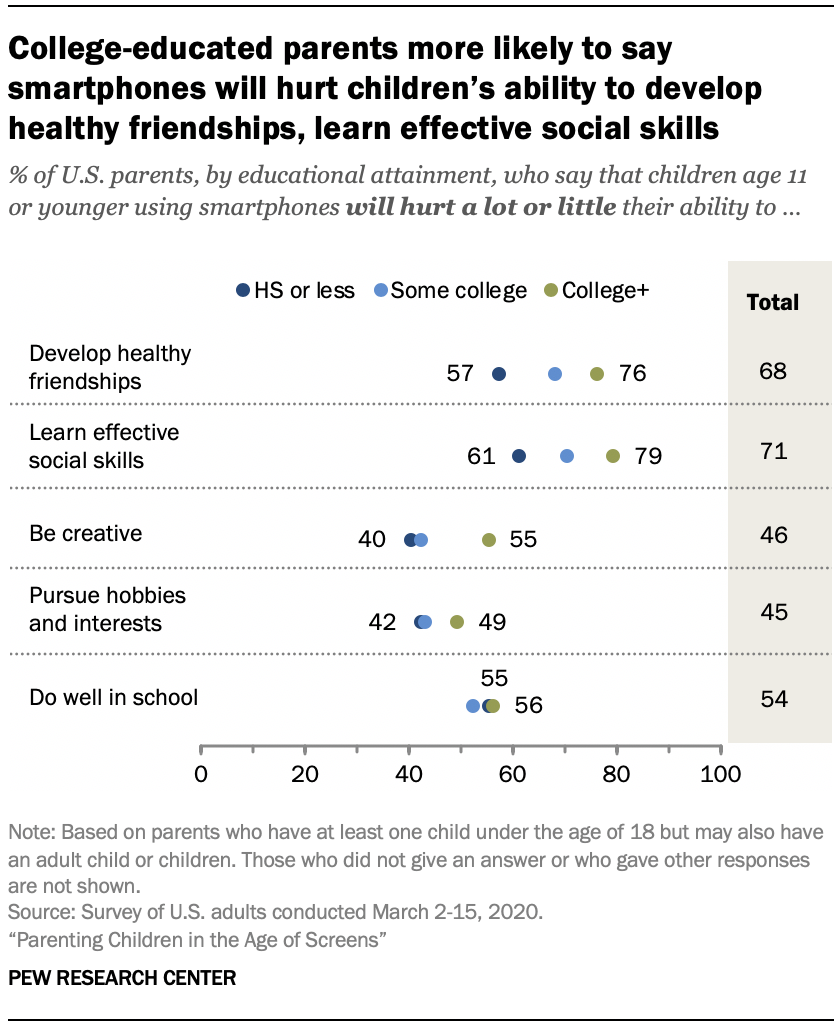
Parents’ views about the potential impact smartphones will have on young children vary by level of education. For example, 76% of college-educated parents say smartphones would hurt children’s abilities to develop healthy friendships at least a little, compared with 57% of parents who have a high school education or less. Similar gaps are present in views about smartphones’ effect on learning effective social skills, being creative, and pursuing their hobbies and interests, with parents who have a college education being particularly wary of smartphones’ impact on these activities.
A majority of parents say children should be at least 12 years old to have their own smartphone
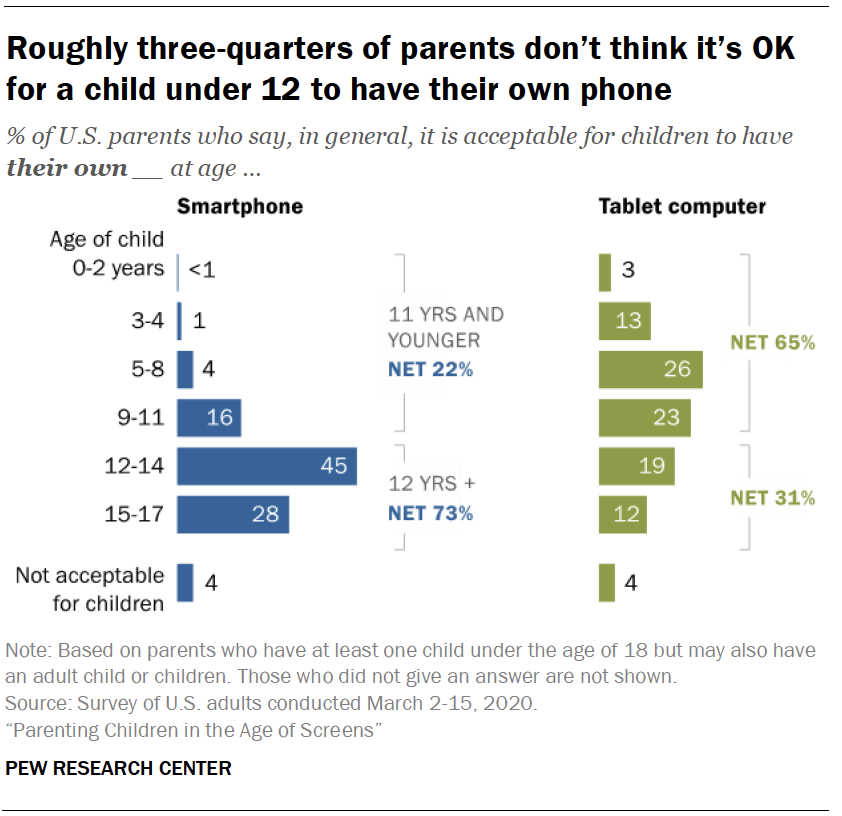
Fully 73% of parents – not just those who have young children – believe children should be at least 12 years of age before it is acceptable for them to have their own smartphone. Just 22% of parents think it is OK for a child under the age of 12 to have their own phone, with only 1% saying this is acceptable for non-school age children.
While parents generally frown on younger children having their own smartphone, parents are more accepting of younger children having their own tablet computer, with 65% of parents saying it is acceptable for children under the age of 12 to have their own tablet. This includes 26% who say having a tablet is acceptable for children ages 5 to 8 and 16% who are OK with children under age 5 having this type of device.
Only a small share of parents – 4% each – say that no child under the age of 18 should have their own smartphone or tablet.
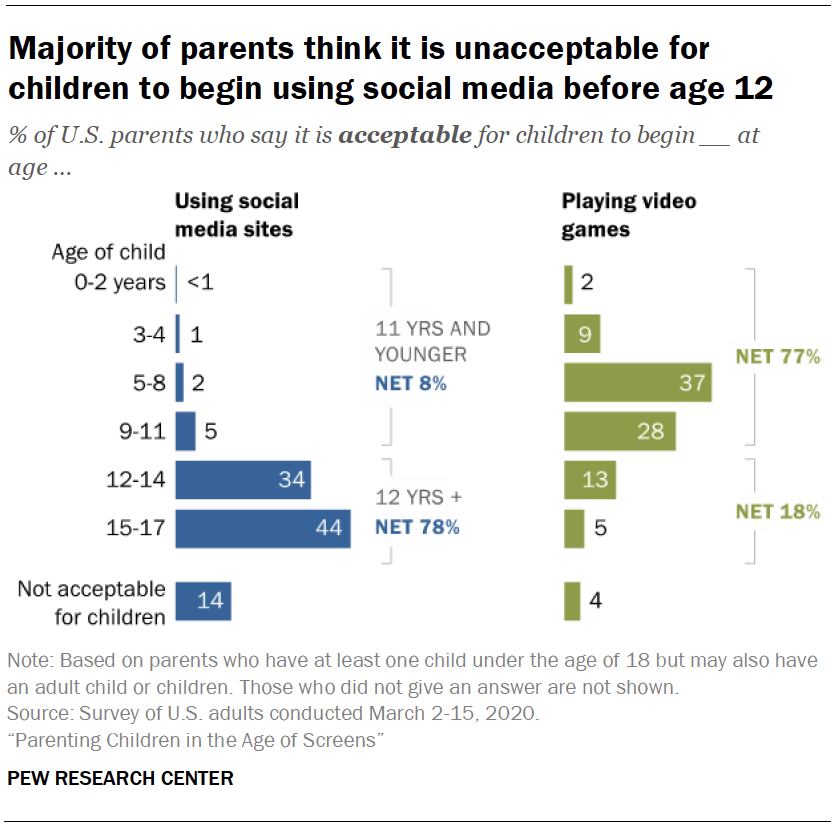
Most social media sites have age requirements for their users, generally set at age 13. These survey findings suggest parents widely believe that children under the age of 12 should not be using social media. A large majority of parents (78%) say that children should be 12 or older to begin using these sites. This includes 44% who say that a young person should be at least age 15 before using these platforms and 34% who say it is acceptable to begin use between the ages of 12 and 14. Just 8% of parents think these sites are acceptable for children 11 and under to use.
Roughly three-quarters of parents (77%) say it is acceptable for children to begin playing video games when they are younger than 12 – including 37% who say it is acceptable to start between the ages of 5 and 8 and another 28% say it’s acceptable between ages 9 and 11. Just 18% say that children must be 12 or older to begin playing video games, and only 4% say video games are not acceptable for children at all.
Vast majority of parents say parents and guardians have a lot of responsibility in protecting children from inappropriate content online
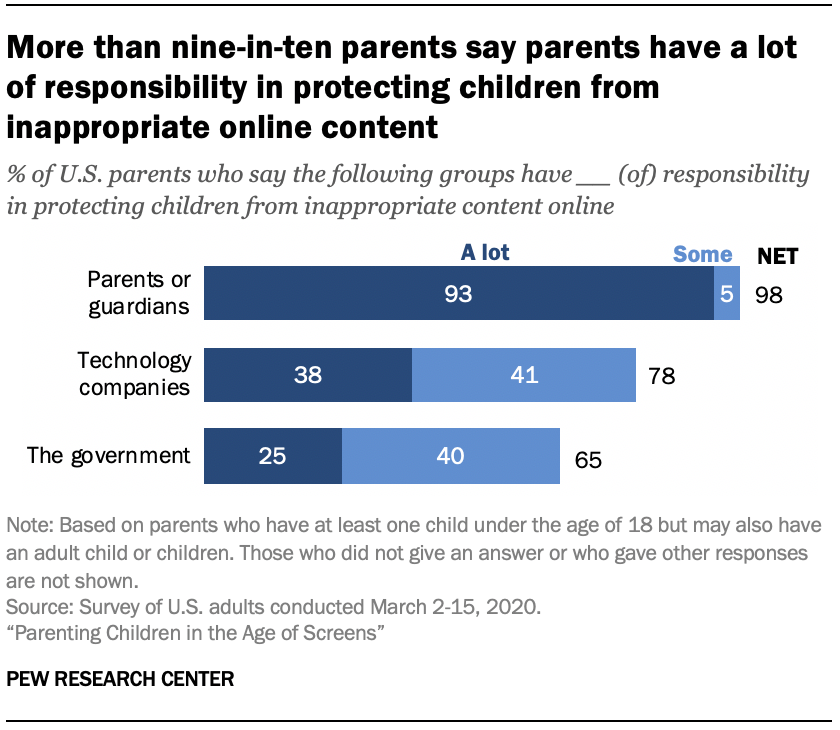
Amid continuing debates about what role companies and institutions should play in protecting children from inappropriate online content, nearly all parents say that most of that responsibility belongs to parents or guardians, this survey finds.
An overwhelming majority of parents (93%) who have at least one child under the age of 18, but who may also have adult children, say that parents and guardians have a lot of responsibility to protect children from inappropriate online content. Much smaller shares say technology companies (38%) or the government (25%) has this same level of responsibility. However, majorities do say that each of these groups have at least some responsibility to do this.
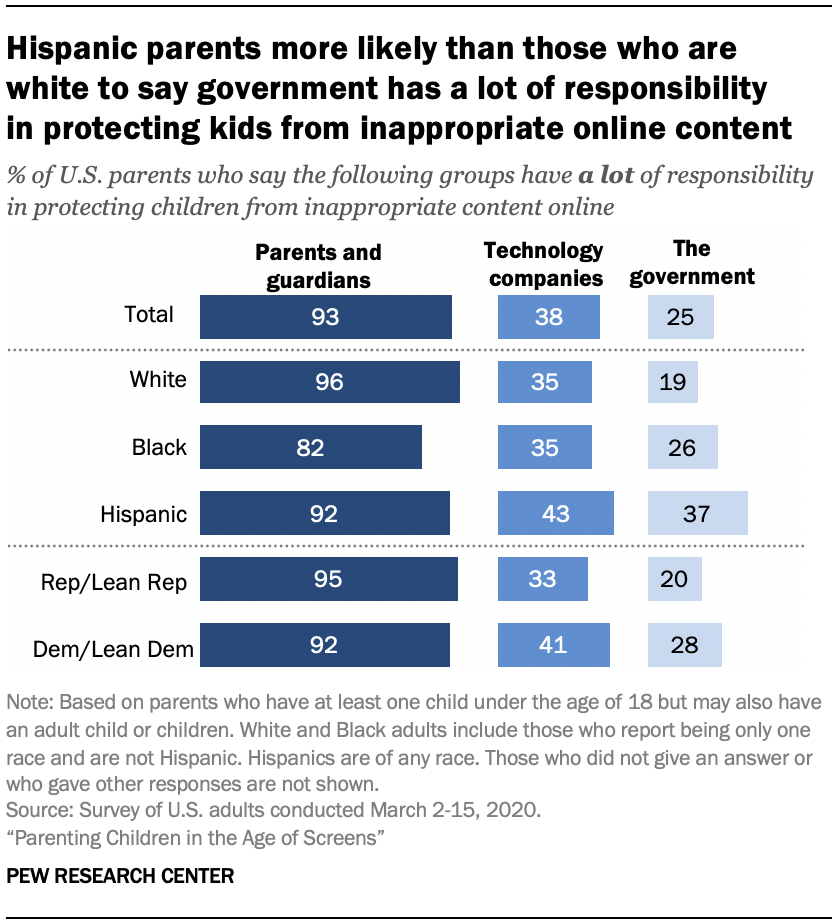
Hispanic parents (43%) are more likely than white parents (35%) to say technology companies have a lot of responsibility in protecting children from online content. Hispanic parents are also about twice as likely as whites to say that the government has a lot of responsibility in protecting children from inappropriate online content (37% vs. 19%).
While majorities of both Democrats and Republicans, including independents who lean toward these parties, believe the government should be involved to some degree in ensuring that children do not have access to inappropriate online content, Democratic parents are somewhat more likely than Republicans to believe that the government bears a lot of responsibility for this (28% vs. 20%).
And while 41% of Democratic parents say tech companies have a lot of responsibility for keeping inappropriate online content away from children, that share is lower for Republicans (33%).
Some parents of tech-using children say their young child spends too much time on tech activities
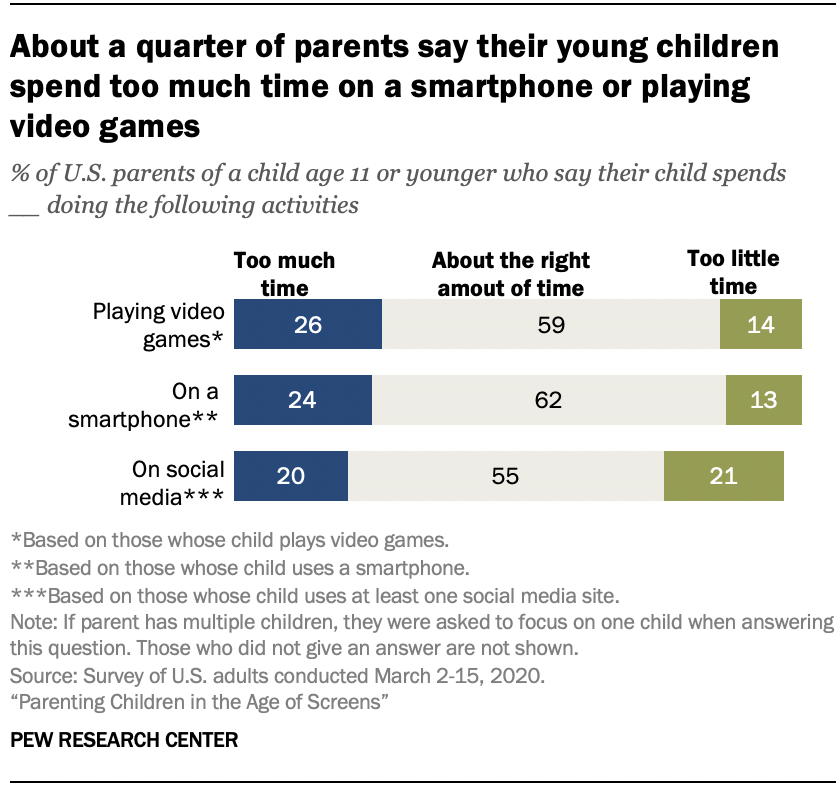
One goal of this survey was to explore parents’ views on the amount of time their child spends on several tech-related activities. To assess this, parents were asked to focus on the behavior of one tech-using child under age 12. (Parents with multiple children under 12 were randomly assigned to answer questions about either the youngest child in the family or the oldest child in this age range.) This question was asked only of parents whose children use particular technologies, including video games, smartphones and social media.
In this context, about one-quarter of parents whose child plays video games say their child spends too much time doing this (26%). Roughly a quarter whose child uses a smartphone say their child spends too much time doing so (24%), while 20% of parents of a social media-using child say their child spends too much time on this activity.
The largest shares say their child spends the right amount of time doing these things. About six-in-ten parents of a smartphone-using child say their child spends the right amount of time on this device (62%), and this holds true when it comes to those whose child plays video games (59%). A somewhat smaller share whose child uses social media (55%) say this activity takes up about the right amount of their child’s time.
Parents’ assessments of the amount of time their tech-using child spends using these technologies does vary by the age of the child. Among parents of a smartphone-using child, roughly three-in-ten whose child is age 5 to 11 (28%) say this child spends too much time on this activity, compared with 17% of those with a child 4 or younger. This is true for video game use as well, with 28% of parents of a child age 5 to 11 believing that child spends too much time playing video games, compared with 15% of parents of a child age 4 or younger who plays video games.
And while parents of boys and girls typically report similar experiences when it comes to smartphone or social media use, 34% of parents of boys who play video games say they spend too much time on this, compared with just 13% of parents of girls who say the same.
Majority of parents say they know what their child is watching, playing or doing online
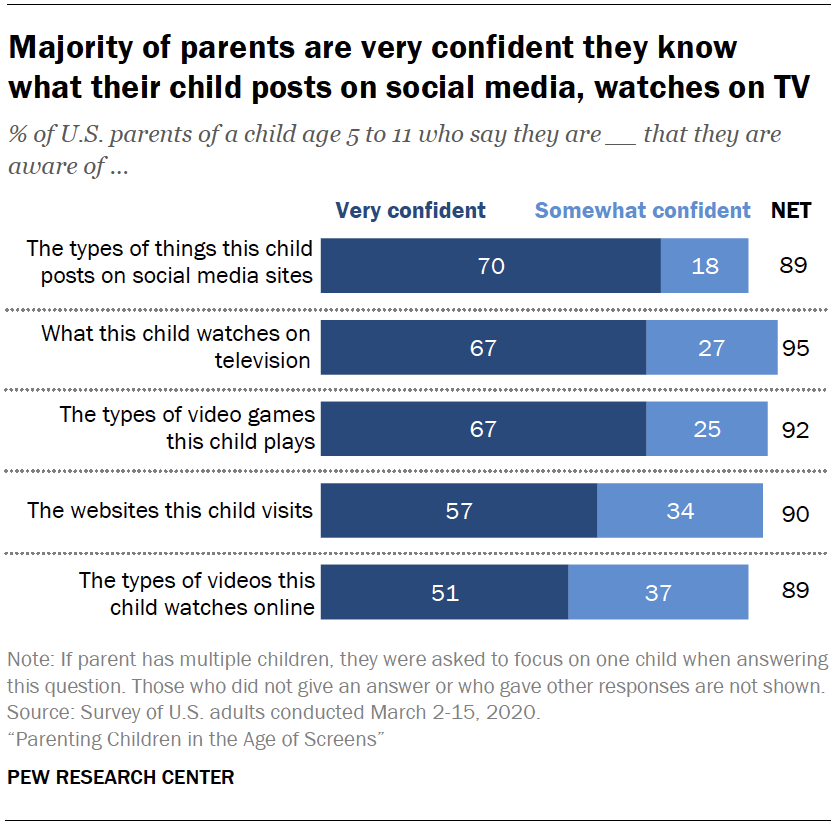
Parents’ confidence about their own awareness of what their child is doing or watching on various digital technologies varies by activity. Roughly seven-in-ten parents of a child between the ages of 5 and 11 say they are very confident they are aware of the types of things their child posts on social media sites (70%), what this child watches on television (67%) and the types of video games their child plays (67%). Roughly half of parents or more have the same level of confidence in their awareness around what websites this child visits (57%) and the types of videos this child watches online (51%).
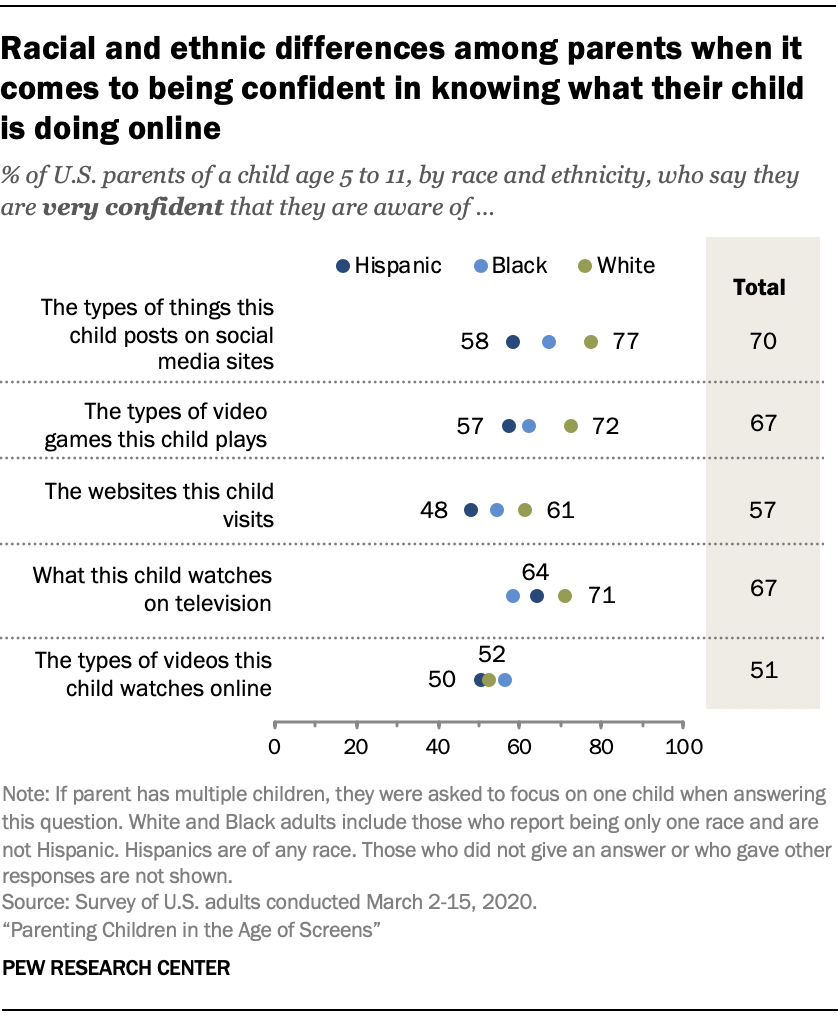
There are differences in confidence levels by the race and ethnicity of parents with children in this age range. Across several of the digital monitoring activities measured in this survey, white parents with a child between the ages 5 to 11 are more likely than Hispanic or Black parents to say they are very confident they know what their child is doing online. Fully 77% of white parents say they are very confident they know what their child posts on social media sites, compared with 67% of Black parents and 58% of Hispanic parents. White parents are also more likely than those who are Hispanic to say they are very confident in knowing the types of video games this child plays and the websites they visit, and white parents are more likely than Black parents to say they are very confident they are aware of what their child watches on television.
More than eight-in-ten parents of young children say they feel confident they know how much screen time is appropriate for their kids
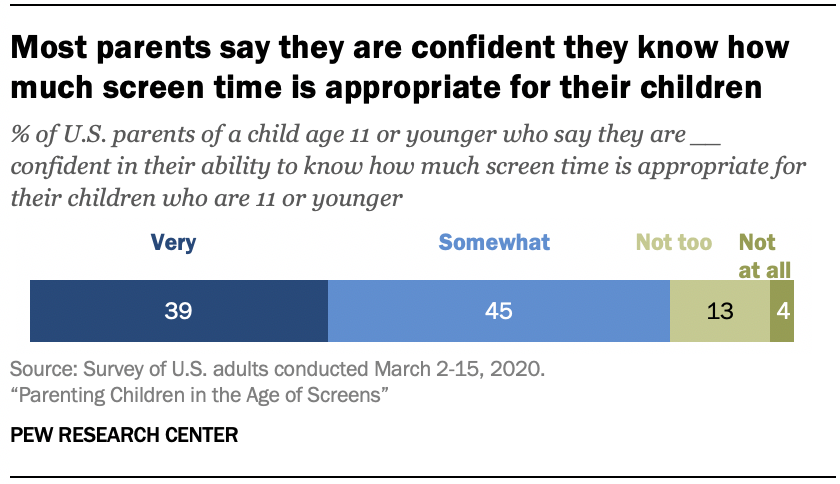
The majority of parents of a child age 11 or younger (84%) say they are somewhat or very confident in their ability to know how much screen time is appropriate for their young children – with four-in-ten (39%) saying they are very confident.
Among those who are more likely to say they are very confident are those with lower levels of education and those who say they do at least a good job as a parent. In this survey, parents were asked to rate the job they are doing as parents; 27% say they are doing a very good job, 62% say a good job, 11% say only a fair job and 1% say a poor job.
Those with a high school diploma or less (45%) and those with some college experience (41%) are more likely than those with a college degree or higher (32%) to say they are very confident about knowing how much screen time is appropriate for their child 11 years old or younger.
Additionally, those who say they do a good job as a parent (85%) are more likely to say they are very or somewhat confident in knowing how much screen time is appropriate, compared with those who say they do a fair or poor job as a parent (69%).
Vast majority of parents say they limit when, how long their child can use screens; digital ‘grounding’ is relatively common among parents
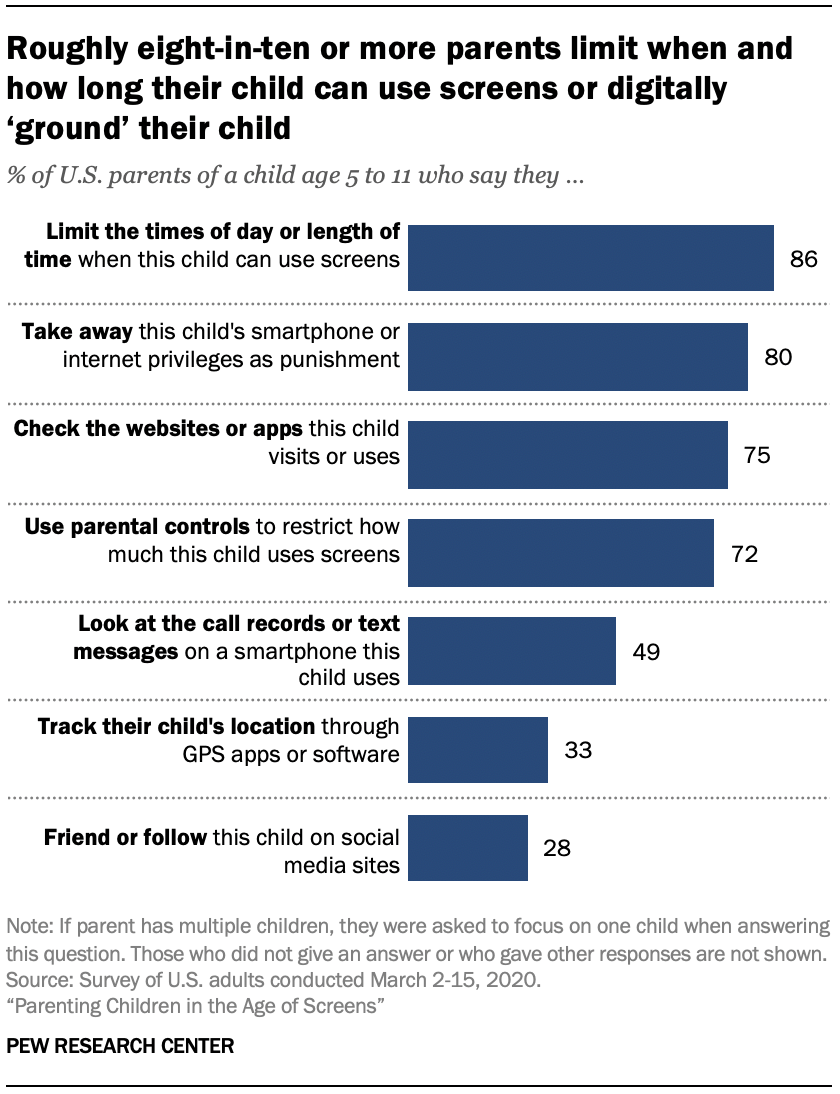
From screen time limits to digital “grounding,” parents report that they monitor and try to impose limits on their child’s digital activities in a number of ways.6
Fully 86% of parents of a child age 5 to 11 say they limit the time of day or length of time their child can use screens, while eight-in-ten say they take away their child’s smartphone or internet privileges as punishment. About three-quarters of parents with a child in this age range say they check the websites this child visits or the mobile apps they use (75%) or use parental controls to restrict how much this child uses screens (72%).
At the same time, roughly half of parents (49%) say they look at the call records or text messages on a smartphone used by this child, while other forms of monitoring like tracking the location of their child through GPS apps or software (33%) or friending or following their child on social media (28%) are far less common.
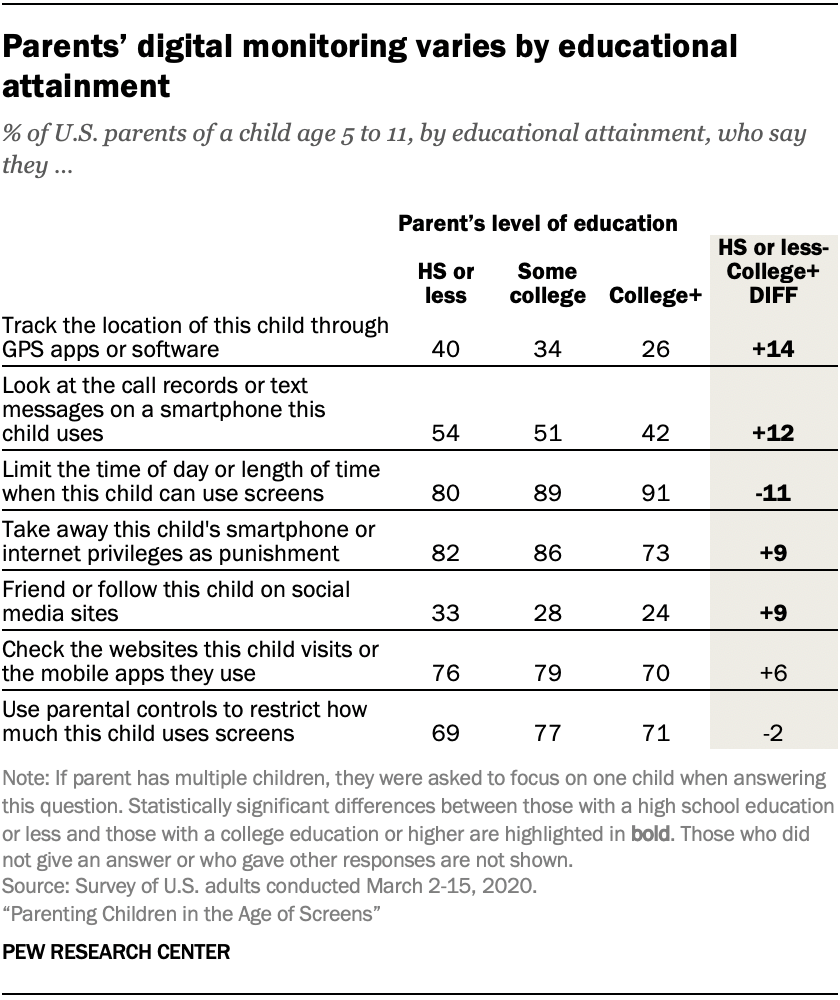
There are differences in these monitoring practices by the age of the child and parent’s level of educational attainment.
Parents with a child age 9 to 11 are more likely than those who have a 5- to 8-year-old to say they looked at the call records or text messages on a smartphone the child uses (57% vs. 40%) or have used GPS apps or software to track the location of that child (41% vs. 25%).
Additionally, parents with lower levels of formal education are more likely to report that they monitor their child in some of these ways. For example, 40% of parents with a high school education or less say they track the location of their child that is between the ages of 5 to 11 through GPS apps or software, compared with 26% of parents with a college degree or more. This pattern holds when parents are asked about looking at the call records of text messages on a smartphone used by their child, taking away their child’s smartphone or internet privileges and friending or following their child on social media.
Most parents say it is OK for child to use a mobile device while riding in the car, but smaller shares permit this during meals
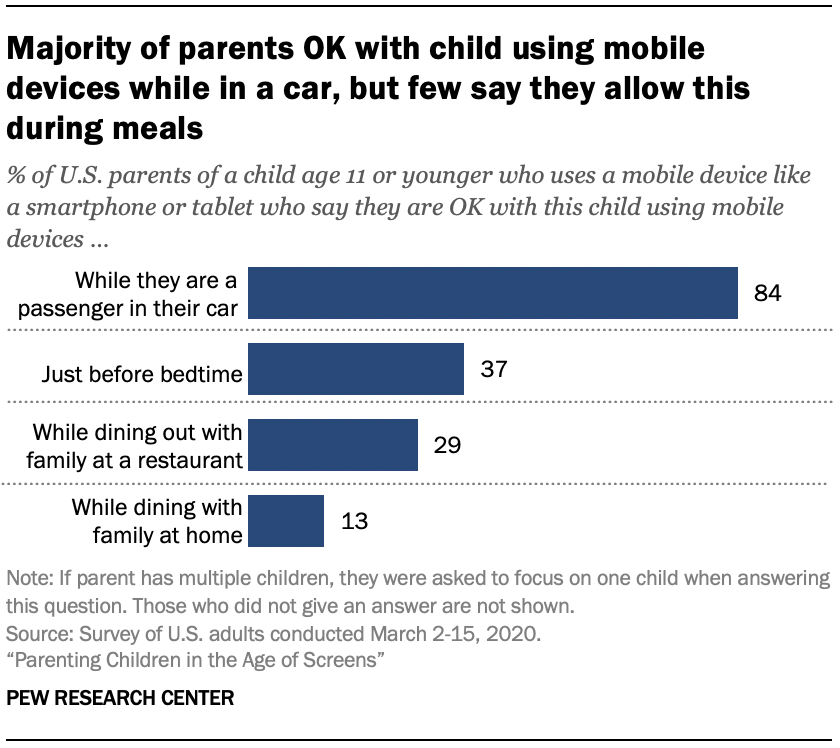
When it comes to when a child age 11 or younger should be allowed to use a mobile device like a smartphone or tablet, parents of these children are more accepting of some situations than others. While a vast majority of parents with a child 11 or younger who uses a mobile device say it is OK for their child to use a mobile device while they were a passenger in a car (84%), far fewer parents are OK with their child using such a device just before bedtime (37%), while dining out at a restaurant with family (29%) or while dining with family at home (13%).
There are differences by race and ethnicity, with Hispanic parents being the least accepting across some cases. For example, 27% of Hispanic parents with a mobile device-using child say they would be OK with their child using a mobile device just before bedtime, compared with 38% of white parents and more than half of Black parents (52%). Hispanic parents (19%) are also less likely to say it is OK for their child to use mobile devices while dining out at a restaurant with family, compared with around three-in-ten of white (33%) or Black parents (31%).
Majority of parents are at least somewhat concerned about their child spending too much time in front of screens
Fully 71% of parents of a child under the age of 12 say they are very or somewhat concerned about their child ever spending too much time in front of screens, including about one-third (31%) who say they are very concerned about this.
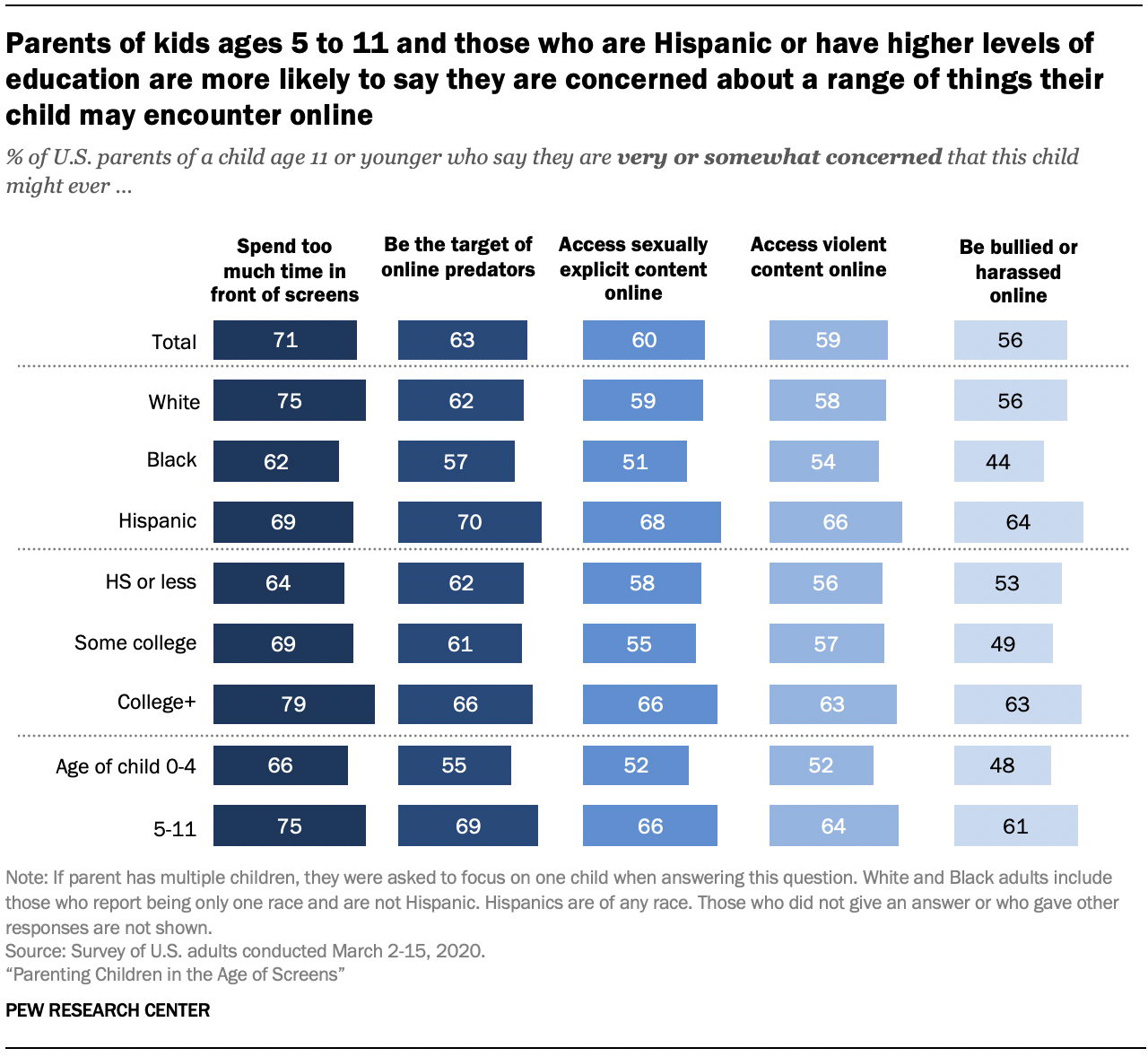
At the same time, roughly six-in-ten parents say they are at least somewhat concerned about their child in this age range ever being the target of online predators (63%), accessing sexually explicit content (60%) and accessing violent content online (59%). Somewhat similar shares (56%) report they are very or somewhat concerned that their child might ever be bullied or harassed online.
Parents of a child age 5 to 11 express more concern when compared with parents of a child age 4 or younger. For example, 66% of parents of a child age 5 to 11 say they are at least somewhat concerned about their child ever accessing sexually explicit content online, compared with about half of parents (52%) of a child age 4 or younger who say the same. This is also true when parents are asked about their concern about their child spending too much time in front of screens, being the target of online predators, accessing violent online content and being bullied or harassed online.
There are also differences by race and ethnicity. Hispanic parents of a child under the age of 12 are more likely than white or Black parents to say they are concerned that their child might ever be bullied or harassed online, with 64% of Hispanic parents saying this is very or somewhat concerning, compared with 44% of Black parents who say the same. White parents fall in the middle, with 56% saying they are very or somewhat concerned about this. This trend holds when asked about being very or somewhat concerned about their child being the target of online predators as well as accessing sexually explicit or violent content online. On the other hand, 75% of white parents say they are at least somewhat concerned about the amount of screen time their child is getting, compared with 69% of Hispanic parents and 62% of Black parents.
Parents with higher levels of educational attainment who have a child age 11 or younger are also more concerned about most of these scenarios than parents who have lower levels of education. For instance, about eight-in-ten parents (79%) with a college education or higher are concerned about their child spending too much time in front of screens, compared with 69% of parents who have some college education and 64% of parents who have a high school education. This trend follows for parental concerns about accessing sexually explicit and violent content online and their child being bullied or harassed online.
Vast majority of parents of a child under 12 say their child has not been bullied online; most are confident child would tell them if they were
Some 56% of parents of children 11 and younger say they are very or somewhat concerned about their child being bullied or harassed online, yet instances of harassment are not highly reported by parents of young children.
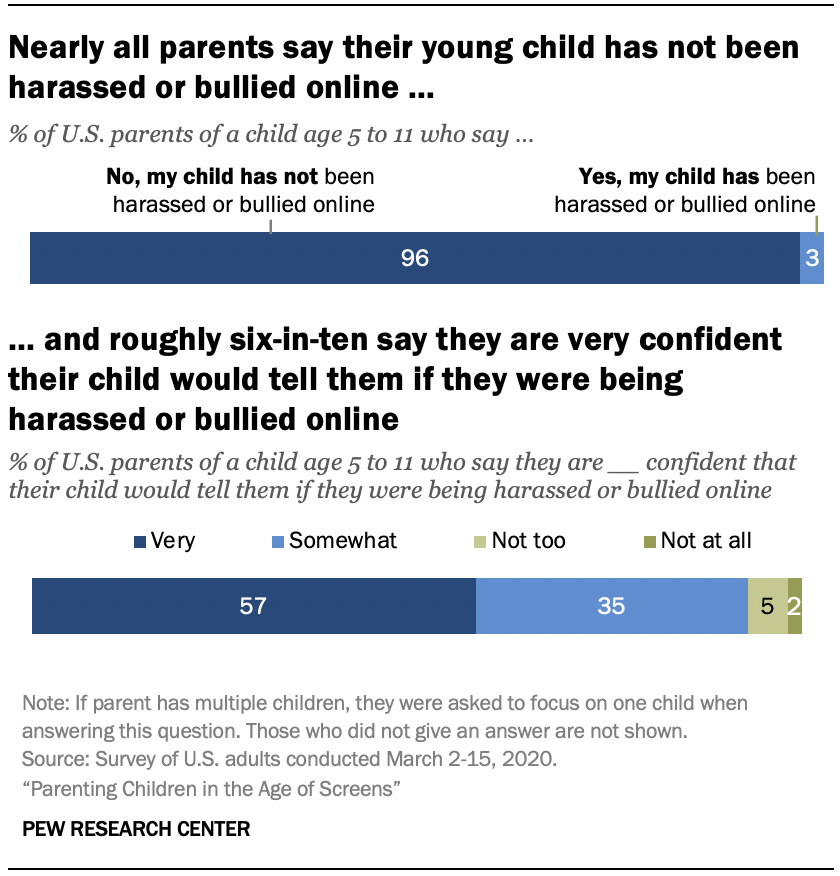
The overwhelming majority of parents of children age 5 to 11 (96%) say that, as far as they know, their child has never been harassed or bullied online. Just 3% say their child has been harassed or bullied online to their knowledge. At the same time, 92% of parents are at least somewhat confident that their child would tell them if they were being cyberbullied, including about six-in-ten (57%) who say they are very confident about this.
Parents’ confidence that their child age 5 to 11 would tell them if they were being bullied or harassed online varies by race and ethnicity and educational attainment. Black (66%) and Hispanic (64%) parents are more likely to say they are very confident their child would tell them if this was happening to them online when compared with white parents (55%).
Majorities of parents across educational levels are at least somewhat confident that their child would confide in them about these issues, but parents with some college experience or who have a high college education or less (65% for each) are more likely than those with a bachelor’s or advanced degree (44%) to say they are very confident that their child would tell them if they were being bullied online.




